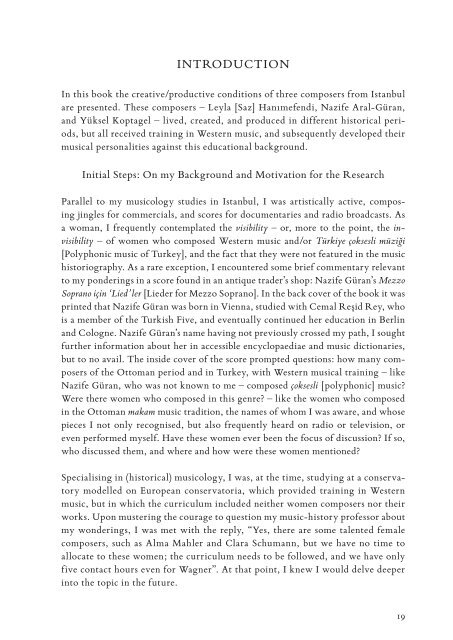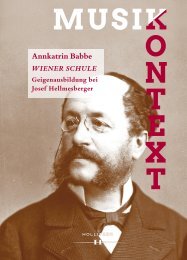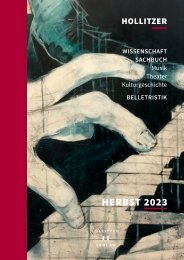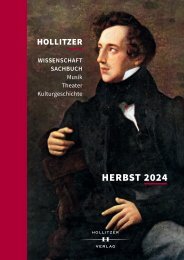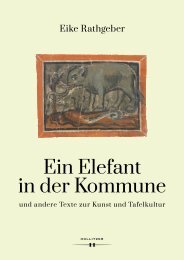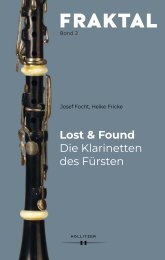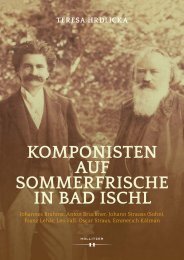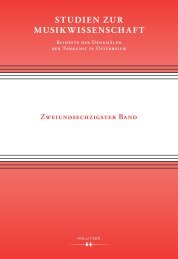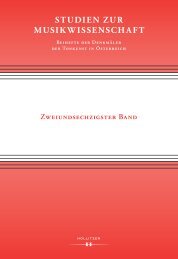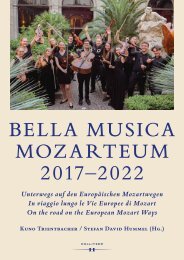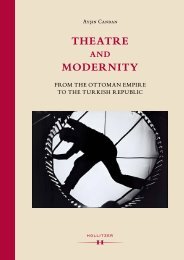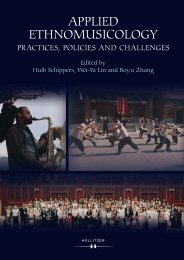You also want an ePaper? Increase the reach of your titles
YUMPU automatically turns print PDFs into web optimized ePapers that Google loves.
INTRODUCTION<br />
In this book the creative/productive conditions of three composers from Istanbul<br />
are presented. These composers – Leyla [Saz] Hanımefendi, Nazife Aral-Güran,<br />
and Yüksel Koptagel – lived, created, and produced in different historical periods,<br />
but all received training in Western music, and subsequently developed their<br />
musical personalities against this educational background.<br />
Initial Steps: On my Background and Motivation for the Research<br />
Parallel to my musicology studies in Istanbul, I was artistically active, composing<br />
jingles for commercials, and scores for documentaries and radio broadcasts. As<br />
a woman, I frequently contemplated the visibility – or, more to the point, the invisibility<br />
– of women who composed Western music and/or Türkiye çoksesli müziği<br />
[Polyphonic music of Turkey], and the fact that they were not featured in the music<br />
historiography. As a rare exception, I encountered some brief commentary relevant<br />
to my ponderings in a score found in an antique trader’s shop: Nazife Güran’s Mezzo<br />
Soprano için ‘Lied’ler [Lieder for Mezzo Soprano]. In the back cover of the book it was<br />
printed that Nazife Güran was born in Vienna, studied with Cemal Reşid Rey, who<br />
is a member of the Turkish Five, and eventually continued her education in Berlin<br />
and Cologne. Nazife Güran’s name having not previously crossed my path, I sought<br />
further information about her in accessible encyclopaediae and music dictionaries,<br />
but to no avail. The inside cover of the score prompted questions: how many composers<br />
of the Ottoman period and in Turkey, with Western musical training – like<br />
Nazife Güran, who was not known to me – composed çoksesli [polyphonic] music?<br />
Were there women who composed in this genre? – like the women who composed<br />
in the Ottoman makam music tradition, the names of whom I was aware, and whose<br />
pieces I not only recognised, but also frequently heard on radio or television, or<br />
even performed myself. Have these women ever been the focus of discussion? If so,<br />
who discussed them, and where and how were these women mentioned?<br />
Specialising in (historical) musicology, I was, at the time, studying at a conservatory<br />
modelled on European conservatoria, which provided training in Western<br />
music, but in which the curriculum included neither women composers nor their<br />
works. Upon mustering the courage to question my music-history professor about<br />
my wonderings, I was met with the reply, “Yes, there are some talented female<br />
composers, such as Alma Mahler and Clara Schumann, but we have no time to<br />
allocate to these women; the curriculum needs to be followed, and we have only<br />
five contact hours even for Wagner”. At that point, I knew I would delve deeper<br />
into the topic in the future.<br />
19


